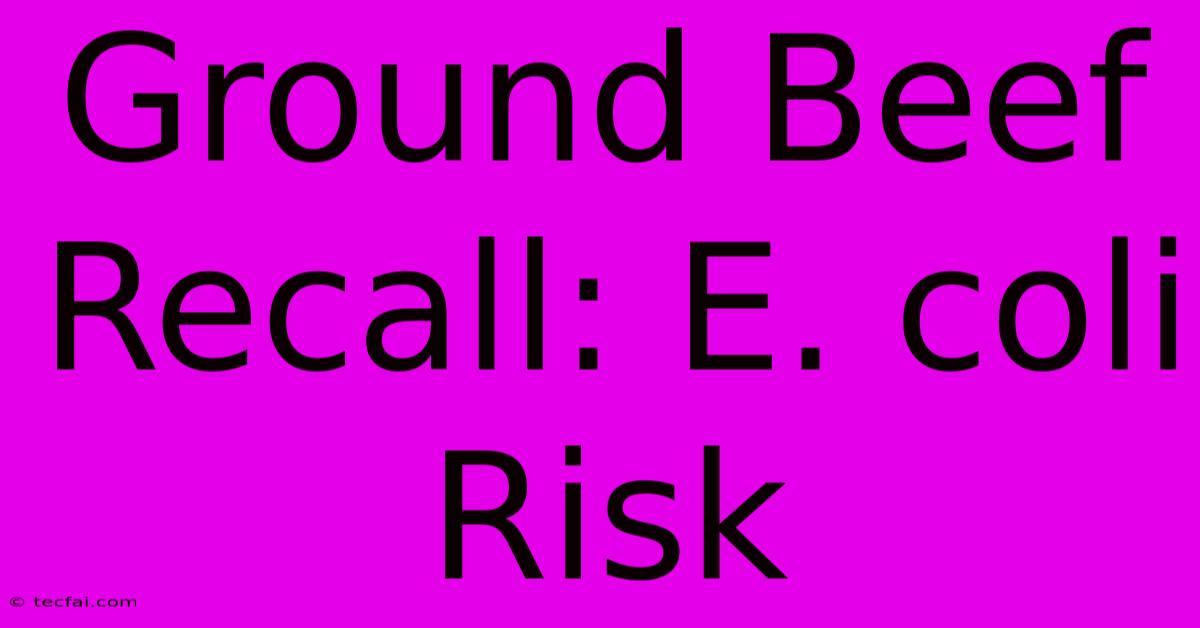Ground Beef Recall: E. Coli Risk

Discover more detailed and exciting information on our website. Click the link below to start your adventure: Visit Best Website tecfai.com. Don't miss out!
Table of Contents
Ground Beef Recall: Understanding the E. coli Risk
The unsettling news of a ground beef recall can send shivers down anyone's spine. The potential presence of E. coli, a dangerous bacteria, makes this a serious public health concern. This article will delve into the specifics of ground beef recalls, the risks associated with E. coli contamination, and what you can do to protect yourself and your family.
Understanding the Recall Process
Ground beef recalls are initiated by the United States Department of Agriculture's Food Safety and Inspection Service (USDA-FSIS) when contamination is suspected or confirmed. This typically happens after testing reveals the presence of harmful bacteria like E. coli, Salmonella, or Listeria. The recall process involves several steps:
- Identification of the contaminated product: This often involves tracing the beef back to its source, pinpointing specific batches or production dates.
- Notification of retailers and consumers: The USDA-FSIS works with retailers to remove the affected product from shelves and issues public announcements through various channels, including press releases, social media, and its website.
- Investigation and remediation: The source of the contamination is investigated to prevent future occurrences. This may involve inspecting processing plants and implementing improved safety measures.
The Dangers of E. coli Contamination in Ground Beef
Escherichia coli (E. coli) is a type of bacteria that can cause various illnesses, ranging from mild diarrhea to severe, life-threatening conditions. Certain strains, such as E. coli O157:H7, produce toxins that can lead to:
- Hemolytic Uremic Syndrome (HUS): A serious complication that damages the kidneys and can lead to kidney failure. This is particularly dangerous for young children, the elderly, and individuals with compromised immune systems.
- Bloody diarrhea: This is a hallmark symptom of E. coli infection and can indicate a serious health risk.
- Severe abdominal cramps: Intense stomach pain is another common indicator of E. coli poisoning.
- Vomiting and fever: These symptoms can accompany the more serious gastrointestinal issues.
It's crucial to note that not all E. coli strains are harmful. However, the potential for serious illness warrants immediate action when a recall is announced.
Recognizing Symptoms
If you suspect you or a family member has consumed contaminated ground beef and are experiencing any of the symptoms mentioned above, seek immediate medical attention. Early diagnosis and treatment are essential to minimizing the risk of complications.
Protecting Yourself from E. coli in Ground Beef
While recalls help mitigate risk, proactive measures can further enhance food safety:
- Check for recall notices: Regularly check the USDA-FSIS website and other news outlets for recall announcements.
- Proper food handling: Always cook ground beef to an internal temperature of 160°F (71°C) to kill any harmful bacteria. Use a food thermometer to ensure proper cooking.
- Thorough handwashing: Wash your hands thoroughly with soap and water before and after handling raw ground beef.
- Clean surfaces: Sanitize all surfaces that have come into contact with raw ground beef to prevent cross-contamination.
- Separate raw and cooked foods: Keep raw ground beef separate from other foods to prevent contamination.
Conclusion: Staying Informed is Key
Staying informed about ground beef recalls and practicing safe food handling techniques are crucial steps in protecting yourself and your family from the risks associated with E. coli contamination. By following these guidelines and promptly responding to recall notifications, you can significantly reduce your risk of illness and ensure safer food consumption. Remember, when in doubt, throw it out. Your health is worth it.

Thank you for visiting our website wich cover about Ground Beef Recall: E. Coli Risk. We hope the information provided has been useful to you. Feel free to contact us if you have any questions or need further assistance. See you next time and dont miss to bookmark.
Featured Posts
-
Bumrahs Four Wicket Haul Ind Vs Aus
Nov 22, 2024
-
Oura Ring Boosting Mindfulness
Nov 22, 2024
-
Government Of Nl Matching Grants
Nov 22, 2024
-
Linda Shares Coleens Biggest Error
Nov 22, 2024
-
Junior Dubai Desert Classic Entry Opens
Nov 22, 2024
